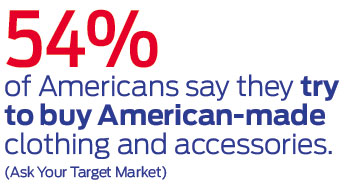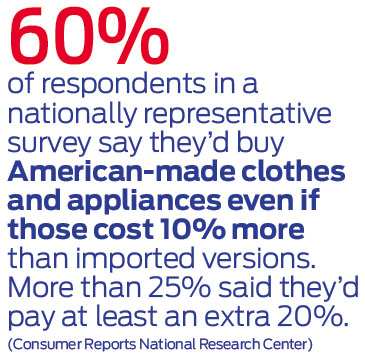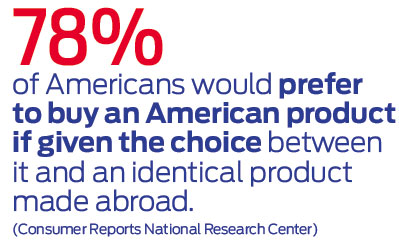August 23, 2016
Made-In-USA Rules and Regulations for Distributors
Regulations regarding Made-in-USA claims can get technical. Here are basics distributors should know.
 “All or Virtually All”: Under the rules of the Federal Trade Commission (FTC), a product must be “all or virtually all” made in the U.S. to be called ‘Made in USA’ or otherwise represented as being of domestic origin. “All or virtually all” means that all significant parts and processing that go into the product must be from the U.S. A product should have no – or negligible – foreign content.
“All or Virtually All”: Under the rules of the Federal Trade Commission (FTC), a product must be “all or virtually all” made in the U.S. to be called ‘Made in USA’ or otherwise represented as being of domestic origin. “All or virtually all” means that all significant parts and processing that go into the product must be from the U.S. A product should have no – or negligible – foreign content.

 The California Caveat: Until recently, California had a Made-in-USA standard that was even stricter than the federal government’s regulations. The Golden State required that 100% of a product must be made of U.S. content – no “virtually all” allowed. Last year, however, California changed the rule so that a Made-in-USA claim is valid if a product gets no more than 5% of its final wholesale value from abroad, or 10% if a manufacturer can show it can’t obtain the materials/parts in the U.S.
The California Caveat: Until recently, California had a Made-in-USA standard that was even stricter than the federal government’s regulations. The Golden State required that 100% of a product must be made of U.S. content – no “virtually all” allowed. Last year, however, California changed the rule so that a Made-in-USA claim is valid if a product gets no more than 5% of its final wholesale value from abroad, or 10% if a manufacturer can show it can’t obtain the materials/parts in the U.S.
 Qualified Claims: In addition to straight Made-in-USA claims, the FTC allows product purveyors to make qualified claims, which describe the extent, amount or type of a product’s domestic content or processing. When executed correctly, these claims clearly indicate the extent to which a product isn’t entirely of domestic origin. To use an FTC example, say an exercise treadmill is manufactured in the U.S. of mostly foreign parts. An appropriate qualified claim could be “Made in U.S. From Imported Parts” or “Assembled in USA.”
Qualified Claims: In addition to straight Made-in-USA claims, the FTC allows product purveyors to make qualified claims, which describe the extent, amount or type of a product’s domestic content or processing. When executed correctly, these claims clearly indicate the extent to which a product isn’t entirely of domestic origin. To use an FTC example, say an exercise treadmill is manufactured in the U.S. of mostly foreign parts. An appropriate qualified claim could be “Made in U.S. From Imported Parts” or “Assembled in USA.”

 Textile Labeling: The Textile Fiber Products Identification Act and Wool Products Labeling Act allow a Made-in-USA label on most clothing and other textile or wool household products only if the final product is manufactured in the U.S. of fabric that is made in the U.S. This applies regardless of where materials earlier in the manufacturing process (such as yarn) came from. A textile or wool product partially manufactured in the U.S. and partially manufactured in another country must be labeled to show both foreign and domestic processing. Textile products that are imported must be labeled as required by U.S. Customs.
Textile Labeling: The Textile Fiber Products Identification Act and Wool Products Labeling Act allow a Made-in-USA label on most clothing and other textile or wool household products only if the final product is manufactured in the U.S. of fabric that is made in the U.S. This applies regardless of where materials earlier in the manufacturing process (such as yarn) came from. A textile or wool product partially manufactured in the U.S. and partially manufactured in another country must be labeled to show both foreign and domestic processing. Textile products that are imported must be labeled as required by U.S. Customs.
 Textile Advertising: Regarding textiles, the FTC requires companies to disclose country of origin information in mail order or online advertising, such as catalogs, including those disseminated on the internet. The FTC says that product descriptions in these ads must include a statement that the product was made in the USA, imported or both. For instance, companies can use “Made in USA and Imported” to indicate manufacture in the U.S. from imported materials, or part processing in the U.S. and part in a foreign country. Similarly but slightly different, “Made in USA or Imported” can reflect that some units of an item originate from a domestic source and others from a foreign source.
Textile Advertising: Regarding textiles, the FTC requires companies to disclose country of origin information in mail order or online advertising, such as catalogs, including those disseminated on the internet. The FTC says that product descriptions in these ads must include a statement that the product was made in the USA, imported or both. For instance, companies can use “Made in USA and Imported” to indicate manufacture in the U.S. from imported materials, or part processing in the U.S. and part in a foreign country. Similarly but slightly different, “Made in USA or Imported” can reflect that some units of an item originate from a domestic source and others from a foreign source.
 Guidance & Enforcement: While the FTC doesn’t pre-approve Made in USA assertions, it provides informal counseling to companies eager to ensure their claims are correct. The FTC also investigates credible complaints about potential improper claims of U.S. origin, providing guidance for remediation to those whose Made in USA representations are invalid and, where necessary, taking legal action against alleged perpetrators that fail to correct deceptive claims. “The bottom line is that our mission is to prevent consumer deception,” says Julia Solomon Ensor, staff attorney in the FTC’s Bureau of Consumer Protection Division of Enforcement. “You need to tell the truth and be able to prove it. We’re available to help companies who want to do that.”
Guidance & Enforcement: While the FTC doesn’t pre-approve Made in USA assertions, it provides informal counseling to companies eager to ensure their claims are correct. The FTC also investigates credible complaints about potential improper claims of U.S. origin, providing guidance for remediation to those whose Made in USA representations are invalid and, where necessary, taking legal action against alleged perpetrators that fail to correct deceptive claims. “The bottom line is that our mission is to prevent consumer deception,” says Julia Solomon Ensor, staff attorney in the FTC’s Bureau of Consumer Protection Division of Enforcement. “You need to tell the truth and be able to prove it. We’re available to help companies who want to do that.”

